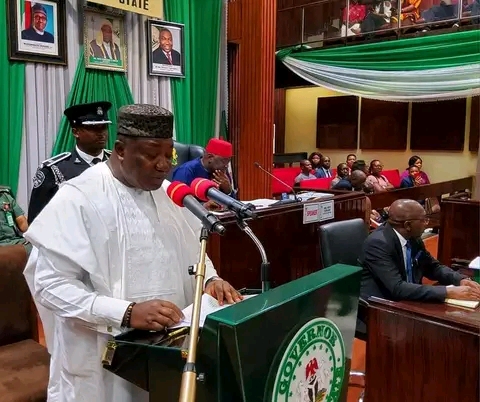Governor Ifeanyi Ugwuanyi ruled Enugu State from 2015 to 2023. His administration was not devoid of scandals and harsh criticism like the past administrations in the state. There are also good achievements in the state that can be tied down to what he was able to do in office. In this post, we’ll be looking at Governor Ifeanyi Ugwuanyi’s scorecard and performance from 2015 to 2023.
On his election in 2015, which he won by a landslide under PDP, there were many expectations from the public on Ifeanyi Ugwuanyi’s administration. However, some of these expectations were not met. There are several contradictory views about his government. However, in this post, we are doing a balanced study of his performance in government.
Now, look at some of his performances and scorecards along with the limitations of his government.
Governor Ifeanyi Ugwuanyi’s Scorecard and Performance from 2015 to 2023
1. Education sector. Ugwuanyi’s greatest achievement is in education as he paid close attention to the sector, from primary level to tertiary level, the administration ensured it made good input in the sector. The administration made its own counterpart education funding available as they worked on school buildings and provided modern seats for pupils and students.
The administration also employed over 2000 teachers and lecturers across the state’s institutions.
The tertiary schools of the state including ESUT, IMT, Enugu State Polytechnic and ESCET saw infrastructural and educational development. In addition, there was the establishment of a new school, State University of Medical and Applied Science, Igbo-eno, as a specialist teaching hospital, a medical and science university.
The administration paid close attention to education so much that the state came first in WAEC examination among public schools and second overall in Nigeria in 2021 academic session.
2. Health sector. This is another sector the administration worked very hard in. The work in the sector was promoted by the COVID-19 pandemic and some other health crises in the state.
The administration constructed an over 100-bed teaching and specialist hospital in Enugu North zone to cater for the tertiary level treatment of the patients from the zone. It refurbished and constructed over 3 general hospitals and 5 regional mini-hospital. The administration also improved the services rendered at ESUT Teaching Hospital, Park Lane, and the facilities.
Enugu’s maternal and child mortality rate in Nigeria is one of the lowest in the country. The state’s health system is also one of the best in the country.
3. On the issue of improving the economy, the administration failed on this aspect. Enugu’s GDP and economy didn’t expand since Governor Ifeanyi Ugwuanyi took over. The economy only adjusted to the inflation, and is in no way compared to the growth of state economies like Kaduna, Lagos, Anambra, Delta, and so on. It is as if the state remained economically stagnant during his leadership.
The agricultural sector of the state is still largely crude. The entertainment sector is nearly dead. A majority of rural areas in Enugu lack basic infrastructure that could have boosted productivity.
Many analysts believe Enugu has more than what it currently has as it’s economy, it only need capable hand to discover and expand it.
4. Democratic policies and human rights. The administration ensured there was full protection of human rights, promoting democratic policies. Even though there were traces of imperfection, the government tried in upholding these policies, rule of law, press freedom, and freedom of speech. This was one of the cardinal points of his manifesto, so he can be said to have functioned here.
5. Infrastructure in the state. Governor Ifeanyi Ugwuanyi’s administration can be rated average on this one. Compared to the previous governor’s, Sullivan Chime’s, Ifeanyi Ugwuanyi didn’t do much on infrastructure, especially in Enugu metropolis. The administration claimed they worked more in rural areas but those rural areas of Enugu still have acute shortage of social amenities and public infrastructure, most especially, tarred roads.
Though, the administration can be commended for the infrastructural development and facelift given to Nsukka. Nsukka is Enugu State’s second largest city. This residents of this city saw the improvement in the standard of living in this city. The rate of development here have improved with increased population.
6. The issue of security as it was handled by the administration is a two-way thing. There were points where the state was safe with minor farmer-herder crisis until the Unknown Gunmen and IPOB agitation shook the state like other parts of Southeast. At this point, the level of killing and insecurity in the state escalated.
There are also other points of farmer-herder crisis affecting some rural areas, preventing them from going to farm. Notwithstanding this, the state is still secure compared to most states in Nigeria.
7. Agriculture and mining sectors. These are the sectors that should be Enugu’s too income generator. They were largely left abandoned by his administration. Ugwuanyi neglected agriculture without making much input to the sector, and totally neglected mining. The oil exploration that he pursued at Uzo-uwani wasn’t also successful.
Conclusion and Verdict
Governor Ifeanyi Ugwuanyi’s scorecard and performance from 2015 to 2023 have been explored here. We can state that the administration wasn’t a high achiever, though. The administration simply did the basic without excellent impact on the lives of people of Enugu. Let’s just say the administration left the people the same way they met them. They performed averagely.
